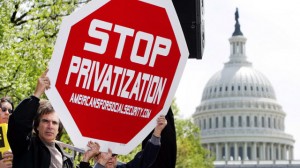
Protestors hold up a placard during a rally against the privatization of Social Security, on Capitol Hill, Tuesday, April 26, 2005, in Washington. (AP Photo/Manuel Balce Ceneta)
The privatization of public services was always driven by an underlying ideological hostility toward government, but it wasn’t sold as such. Rather, privatization was supposed to yield huge, tangible benefits for the public. The ostensible efficiency of the private sector was supposed to result in the provision of better, more extensive services for less money — even after corporate owners took their profits.
In The Atlantic today, Molly Ball reports that these promises have generally failed to come true, and that the real-world track record of privatization is causing a backlash within state and local governments.
Ball writes:
In states and cities across the country, lawmakers are expressing new skepticism about privatization, imposing new conditions on government contracting, and demanding more oversight. Laws to rein in contractors have been introduced in 18 states this year, and three—Maryland, Oregon, and Nebraska—have passed legislation, according to In the Public Interest, a group that advocates what it calls “responsible contracting.”
“We’re not against contracting, but it needs to be done right,” said the group’s executive director, a former AFL-CIO official named Donald Cohen. “It needs to be accountable, transparent, and held to high standards for quality of work and quality of service.” Cohen’s organization, a national clearinghouse exclusively devoted to privatization issues, is the first advocacy group of its kind.
Doing it right, according to Cohen, means ensuring that contractors are subject to standards of transparency and accountability. Private companies doing government work and their contracts should be subject to open-records laws: In 2011, the city of Truth or Consequences, New Mexico, hired a contractor to videotape city meetings, then claimed the tapes weren’t public records. (A state appeals court eventually ruled otherwise.) Companies should be held responsible for cost overruns, and governments should be making sure they’re actually saving money: Many private prisons cost more to operate than public ones, the group claims.
“We are definitely seeing a wave of states and some cities passing laws to get control of contracting,” Cohen said. “There’s still a lot of pressure to outsource, but the trend we see is people trying to fix the process and do it better, because of some of the high-profile failures at the federal and state levels.”
The vogue for privatizing government began in the Reagan years, experts say, when an ascendant conservative ideology painted the public sector as a callous and sluggish bureaucracy and the private sector as inherently more innovative and efficient. The trend accelerated in the ’90s, and today, Cohen estimates that $1 trillion of America’s $6 trillion in annual federal, state, and local government spending goes to private companies.
Yet the public impression of privatization as a panacea for the inherent inefficiency of government has been tarnished in the intervening years. From Halliburton to Healthcare.gov to private prisons and welfare systems, contracting has often proved problematic. Perhaps mindful of these high-profile debacles, lawmakers are now more likely to view privatization and contracting proposals with skepticism. “The ideological fervor for privatization has ebbed,” according to John D. Donahue, an expert on privatization at Harvard’s Kennedy School of Government.

